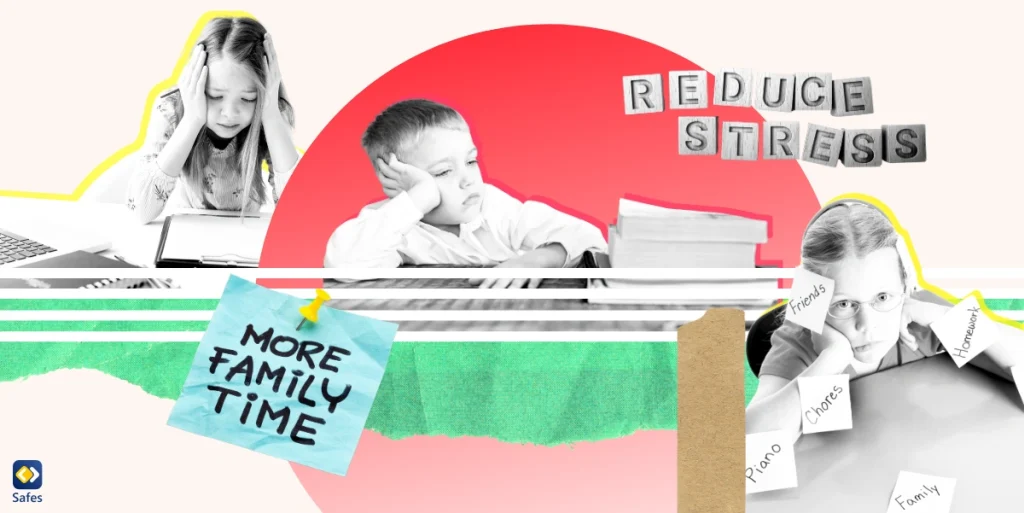An overscheduled child is one who has too little free time due to a heavy load of extracurricular and school activities. This lifestyle can lead to stress and burnout, making it a growing concern for today’s parents. Understanding how not to overschedule your child is crucial for their overall well-being.
Download and Start Your Free Trial of the Safes Parental Control App
The trend of children engaging in numerous extracurricular activities is on the rise. While these activities are beneficial, their cumulative impact can overwhelm young minds and bodies, leading to excessively busy schedules. This blog post aims to provide effective strategies for managing and preventing the risks associated with such demanding routines.
How to Tell If Your Child Is Overscheduled
Before diving into the specifics, let’s first identify the key physical indicators that suggest your child might be dealing with an overly demanding schedule.
Physical Signals
- Fatigue: Notice if your child seems unusually tired despite adequate rest.
- Irritability: Pay attention to mood swings or increased irritability, which could be a sign of exhaustion.
- Frequent Illness: Keep track of how often your child gets sick, as a weakened immune system can result from excessive activity.
Emotional and Behavioral Cues
- Stress and Anxiety: Observe if your child appears stressed or anxious, especially when discussing their schedule.
- Withdrawal: Look for signs of withdrawal from family activities or loss of interest in hobbies they once enjoyed.
- Academic Pressure: Watch out for indications of academic pressure, such as excessive worrying about grades or school performance.
Understanding the Effects
Overscheduling can have profound effects on a child’s development. It not only impacts their physical health but also takes a toll on their emotional well-being. From elementary school to college applications, the pressure to excel in various activities can overwhelm children, hindering their ability to thrive academically and socially. Parents, too, feel the strain of managing their children’s packed schedules, leading to heightened stress levels within the family dynamic. Recognizing these signs early on is crucial in mitigating the negative effects of overscheduling and fostering a healthier balance in children’s lives.

The Impact of Overscheduling on Family Life
When children are overwhelmed with activities, the first casualty often is family time. The dangers of overscheduling your child become apparent as dinners, weekend outings, and even casual conversations become rare. Such reductions in family interaction can leave everyone feeling disconnected during crucial school years.
A child’s packed agenda doesn’t only affect their own stress levels but also spills over to the rest of the household. Parents find themselves constantly on the run, shuttling between commitments and struggling to manage the home, which naturally leads to increased stress and fatigue for them.
The ripple effects also extend to siblings who may feel neglected or sidelined. As the focus intensifies on one child’s schedule, brothers and sisters might struggle with feelings of resentment or competition, potentially leading to strained relationships that can last throughout their kids’ lives.
Recognizing these signs is the first step toward reclaiming peace and balance at home. It’s crucial for parents to evaluate how each commitment impacts their child and the family as a whole, ensuring that the children don’t lose valuable family connections during these formative years.
Benefits of Downtime for Children
Now, let’s explore how unstructured time not only sparks creativity but also significantly enhances mental health in children:
Nurturing Creativity and Mental Health
Research highlights the critical role of free play in fostering creativity and mental health in children. According to Harvard Graduate School of Education, through activities like drawing or building with blocks, children enhance their cognitive skills by learning to classify, create patterns, and develop storytelling abilities. These unstructured play times are essential not just for creativity but for overall intellectual development.
Enhancing Problem-Solving Skills
Experts emphasize that free play is a dynamic way for children to learn problem-solving skills. When children engage in play without strict rules or structures, they learn to navigate challenges and come up with solutions independently. This type of play is vital for building their capacity to address problems creatively and effectively.
Promoting Emotional Self-Regulation
Unstructured time also plays a significant role in developing emotional self-regulation. During play, children experience a range of emotions, which teaches them how to manage feelings like frustration or excitement. This emotional development is crucial for their ability to handle stress and build resilience.
Supporting Social Skills
Free play often involves other children and thus serves as a natural setting for developing social skills. As children interact, they learn vital interpersonal skills such as empathy, cooperation, and communication. This social aspect of play is invaluable in helping children understand how to navigate social situations and build relationships with others ,
Overall, incorporating plenty of free and unstructured time in children’s daily routines, which is part of mindful parenting, is not just beneficial but essential for their development across various domains. These playtimes support their growth into well-rounded, capable, and healthy individuals.

Strategies to Prevent Overscheduling
To prevent your child from becoming an overscheduled kid, focus on their genuine interests. Prioritize activities that align with what truly captivates and engages them, rather than the aspirations you might have. This approach ensures that scheduled activities are fulfilling and not just fulfilling a parental checklist.
Encourage your child to select one or two activities they are most passionate about. This allows them to delve deeper into what they love, promoting a richer experience and mastery of skills. It also keeps their schedule manageable, making room for essential downtime and reducing stress from juggling too many commitments.
Setting clear boundaries around family time and downtime is crucial. Ensure these periods are respected and free from the intrusion of scheduled activities. This balance helps to combat the tendency towards phubbing—ignoring one’s surroundings in favor of a mobile device—and excessive screen time, nurturing healthier relationships and interactions.
Another vital strategy in managing an overscheduled child involves learning to say no to excessive commitments. This might be difficult at first, but it’s necessary to maintain a balanced lifestyle. By doing so, you help your child understand the value of their time and the importance of not overextending themselves.
Smart Scheduling with Safes
Let’s introduce you to the power of Safes, a parental control app designed to help manage and monitor your child’s time effectively. With Safes, parents can ensure that their children are engaging in activities that are beneficial and not overwhelming.
Feature-Filled Assistance
Safes offers robust features such as activity tracking and time limits, enabling parents to keep a close eye on how their children spend their time. By setting boundaries on screen time and other activities and having more options compared to built-in options such as Windows parental controls, parents can help foster a balanced schedule for their kids.
Download for a Balanced Lifestyle
Take control of managing your child’s schedule by downloading the Safes app, available for both iOS and Android devices. This tool is designed to aid in creating a harmonious balance between school, play, and rest, ensuring your child leads a healthy and productive life.
Try Safes for Free
Explore the benefits of Safes without immediate commitment by taking advantage of the free trial. This trial allows parents to test the features and gauge how well it fits with their family dynamics before deciding on a subscription.
Conclusion: Balancing Act – Ensuring Your Child Thrives
It’s crucial to recognize the signs of an overscheduled child—such as stress, fatigue, and a loss of interest in activities they once enjoyed. Acknowledging these indicators early can prevent potential negative impacts on their emotional and physical well-being, helping them maintain a healthier, more balanced lifestyle.
Encourage proactive steps towards creating a balanced schedule for your children. This includes prioritizing downtime and family time, being selective with commitments, and using tools like the Safes app to manage schedules effectively. By doing so, parents can ensure their children enjoy a fulfilling and less stressful childhood.
Your Child’s Online Safety Starts Here
Every parent today needs a solution to manage screen time and keep their child safe online.
Without the right tools, digital risks and excessive screen time can impact children's well-being. Safes helps parents set healthy boundaries, monitor activity, and protect kids from online dangers—all with an easy-to-use app.
Take control of your child’s digital world. Learn more about Safes or download the app to start your free trial today!



